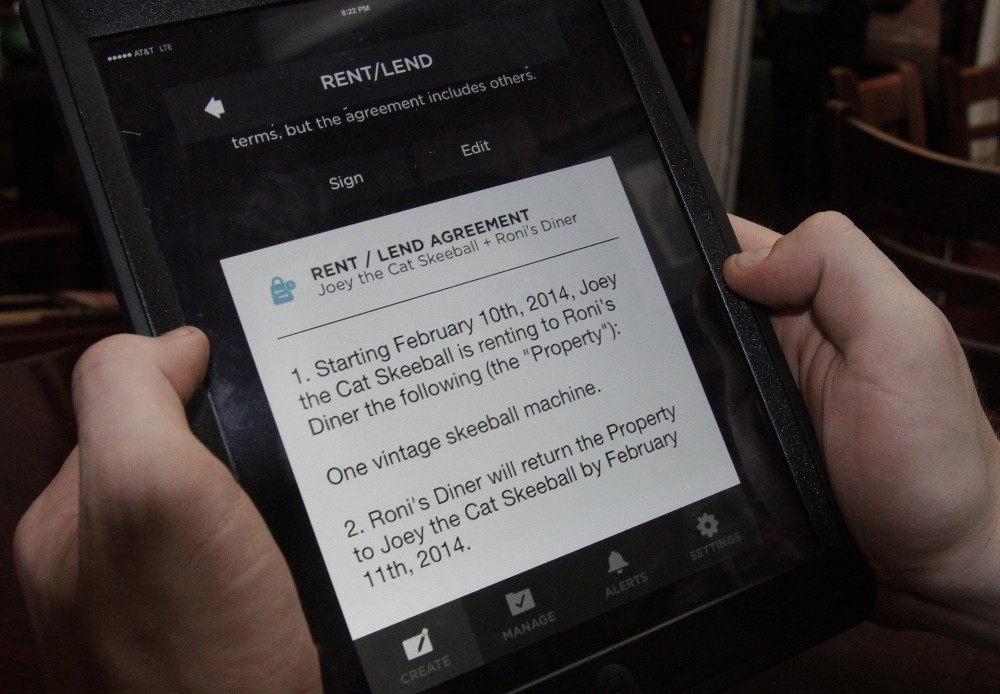By Shan Li
Los Angeles Times.
Joey Mucha used to seal a business deal with a handshake or an email. Now he whips out his smartphone.
The San Francisco entrepreneur runs a side business renting out skee ball machines. With the company growing steadily, Mucha decided last year he needed to use contracts to protect his clients and the business.
But he didn’t go to a pricey lawyer. Instead, the 27-year-old downloaded a smartphone application called Shake. It guided him through the process of creating easy-to-read contracts, which customers can then sign with a swipe of their fingers on the screen.
“I don’t make enough money to pay $250 an hour for a lawyer to draft a contract,” Mucha said. “But I needed something to use as a defense in a scenario where I wasn’t paid, without hiring a lawyer or trying to write my own contract.”
Technology is creeping ever faster into the $200 billion U.S. legal field, shaking up an industry that has long been defined by tradition and dominated by white-shoe firms.
Law firms are already adapting to seismic shifts in the industry. The collapse of several big ones and the downsizing of many other firms during the economic turmoil left thousands of lawyers out of work. Survivors faced a stark new landscape in which clients demanded more flexibility and an alternative to the tradition of billing by the hour.
Industry experts say the industry is ripe for big tech shake-ups, including new innovations on social media and apps for smartphones and tablets.
“As software becomes more intelligent, we will have digital apps that can either substitute for the labor of lawyers or will assist a lawyer in being more productive,” said Richard Granat, co-director of the Center for Law Practice Technology at Florida Coastal School of Law.
The Shake app launched in September with options to create six kinds of contracts, including freelancing, renting, lending money and a write-it-yourself feature.
The app walks users through a series of questions, Who are the two parties? How much money is involved?, and automatically fills in an agreement stripped of unnecessary legal language.
“It’s like TurboTax” for the law, said Abe Geiger, founder and chief executive of Shake Inc. “Legal becomes less of a hurdle when contracts are not long and full of jargon.”
Geiger, whose wife is a lawyer, said he was inspired to create Shake after seeing the inefficiency of law firms, coupled with demand for legal services by the growing ranks of freelancers and entrepreneurs. The sharing economy, in which people earn extra cash by renting out their cars, apartments and free time to strangers, has also boosted the need for cost-effective legal help.
“The deals that happen are more quick and spontaneous,” Geiger said. “You meet someone on Craigslist in a parking lot, a lot of freelancers meet clients in coffee shops, and they all need simple tools.
“Those people typically can’t afford pricey lawyers but still require sound legal help.”
The demand for legal services from low- to middle-income earners who are priced out of expensive attorneys is an estimated $45 billion “latent” market, experts say. Once ignored by the legal industry, they are now targeted by a growing number of startups eager to roll out innovations designed to win over tech-savvy young people.
Meeting that demand could also help improve the poor labor market for lawyers. Among 2012 law school graduates, 84.7 percent were employed nine months after graduation, according to the National Association for Law Placement. That was down from 91.9 percent in 2007.
“There is a huge mismatch of supply and demand in the U.S.,” said John Suh, chief executive of LegalZoom.com Inc. “We have an oversupply of law graduates every year, but for whatever reason, the price has not come down to where most Americans can afford it.”
Suh believes that technology can help change that.
His Glendale, Calif., company, which provides legal documents online and connects clients to lawyers, started a research-and-development group in Silicon Valley in 2011. After nixing a plan to go public this year, Suh said LegalZoom is focused on rolling out new tech products, including a smartphone app.
“We are also looking to purchase and partner with companies in the mobile space,” he said.
Rocket Lawyer Inc. added a Twitter-like feature last year to its mobile app that enables users to submit short questions to lawyers who answer with advice.
The San Francisco startup, which provides legal documents and advice through on-call attorneys, also offers a $39 monthly subscription plan that connects customers to the 500 lawyers who can give help over the phone. In California, about 100 attorneys participate in the plan, said Charley Moore, founder and executive chairman.
“It’s like a health plan with doctors in the network,” he said.
Moore likes to compare Rocket Lawyer to technology companies such as Netflix instead of old-fashioned law firms.
Chad Ridderson, 26, said that affordable services from companies like Rocket Lawyer have saved him from searching online and getting advice from shady sources. The Pasadena, Calif., resident counted on legal startups when he started his own companies and did consulting work in digital marketing.
“I use them instead of Googling for operating agreements and finding a template that someone else uses, which to me is scary and not as effective,” Moore said.
Much like the retail industry, some online legal companies have proved successful enough to open their own brick-and-mortar shops.
LegalForce helps clients with legal documents and also specializes in filing trademarks online, and its downtown Palo Alto, Calif., headquarters is within walking distance of many startups, said Mitesh Patel, senior attorney at the company.
The office is decorated like a young startup, with brightly colored furniture and the words “Law-inspiring” printed on the walls. A 15-minute consultation with a lawyer costs $45.
Customers can also reach attorneys online through the “Chattorney” option and do virtual consultations over Skype.
“The idea is: Let’s get a place where you can find an attorney at 7 o’clock in the evening on a Saturday after work,” Patel said.
“And he can answer a question on my company or trademark.”
Legal help comes in handy even when companies get slightly bigger.
Mucha, the skee ball entrepreneur, expanded to Los Angeles last year with the help of a friend, Andrew Herrold.
Herrold, a freelance photographer, said the Shake app has been handy in protecting the company in case anything goes wrong. The app has been a big hit with customers, who are surprised and then excited by the technology.
buy finasteride generic finasteride without prescription online
“Their first initial reaction is, ‘Whoa!’ ” Herrold said. “But it’s compelling because the language is simple and a quick read.
You can skim it and say, ‘OK, I am not selling my firstborn child.’ ”















































































































































































































































































































































































